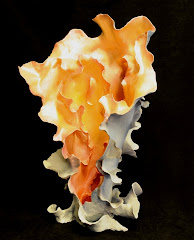O Arjuna!
When spirit degenerates and avarice rages on earth
I reincarnate—
Erupting from the unmanifest,
Bright as a hundred thousand suns,
I come to destroy evil and to resurrect righteousness.
—Bhagavad Gita
SONG OF GOD REVISITED
Prince Arjuna’s eyes flicker wildly over the ranks of the enemy as his chariot blazes across Kurukshetra, resting for crucial seconds on the faces of gurus, relations and friends. As the unspeakable horror that is looming strikes him afresh, a tidal wave of doubt and fear paralyzes the ambidextrous master archer. Shaken, the star of the Pandavas manages to refocus his gaze upon the radiant figure engaged in skillfully steering his chariot through the seething battlefield: it is his comrade and kinsman,Krishna, also known as the Blue God, who has agreed to serve as his driver and counselor in this apocalyptic clash between the forces of good and evil.
Krishna is garbed in colorful attire that flashes like lightning on a stormy night. His skin is hued the dark turquoise of a newborn cloud. Sparkling diamonds adorn his person and a peacock feather waves gaily from his headband. And yet Arjuna is sharply aware that it is not Krishna’s physical glory, but his incandescent wisdom that alone can restore his world to righteous balance. “I beg your counsel, O Krishna!” the Prince cries in desperation. “Evil as my cousins are, I cannot battle my own kin! Is it not an ungodly act to fight those who once showered upon my family their great love?”
But Krishna only flashes Arjuna an inscrutable smile, and the Prince’s handsome head droops onto his chest in despair. “I’m no coward, O Krishna,” Arjuna mutters darkly. “I know the Kauravas are blinded by lust and jealousy...indeed treachery has become their second nature. Yet how can slaying them increase our happiness? Should I not offer myself to be killed, unarmed and unresisting?” And with an exclamation of disgust, Arjuna throws down his magical bow Gandiva and refuses to fight—a good thing, perhaps, since the intensity of his moral dilemma inspires Krishna to unravel the mysteries of the cosmos before him.
As limitless life-forms radiating streams of light separate and merge again to form the boundless being of the god of gods, the Prince hears Krishna’s resonant voice cutting through the din: “Certainly you mean well, O Arjuna!” Krishna says. “And yet your sorrow is sheer delusion: wise men do not grieve for the dead, nor for the living. Never was there a time when I did not exist, or you, or these kings—and nor will there come a time when we cease to be! These bodies come to an end, but that vast Self is ageless, fathomless, eternal!”
This cosmic vision blasts open Arjuna’s inner eye; suffused by grace, the Prince discerns the role of the gods in human life, the impeccability of karmic law, the immortality of the soul, and the way of the noble human. An enormous burden falls away from his hurting heart as he accepts that the spiritual duty or dharma of a spiritual warrior is to first determine what is right, and then to fight the encroaching darkness, disregarding consequences. And with a roar that resounds across Kurukshetra and straight up to the heavens, the shining star of the Pandavas reaches for his bow and recommits to leading his side into battle.
Ψ
Namasthe!
MiraWhat you can do, or dream you can, begin it --
Boldness has magic, power and genius in it.
Goethe
The desire for safety stands against every great and noble enterprise.
Tacitus
The desire for safety stands against every great and noble enterprise.
Tacitus





















No comments:
Post a Comment